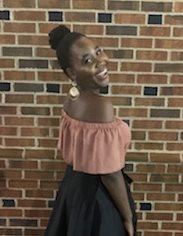A policy studies and sociology major explores how gender and race can impact the political activism of college-aged women.
CELEBRATE! Week offers an annual opportunity to highlight the academic and artistic achievements of Elon students and faculty. Each day this week, we'll be putting the spotlight on a student scholar's research — what they are seeking to find out, and who they became interested in their project.
 Name: Mariatu Okonofua
Name: Mariatu Okonofua
Area of study: Sociology
Major(s): Policy Studies and Sociology
Minor(s): Criminal Justice Studies and Political Science
Faculty mentor: Rajesh Ghoshal, assistant professor of sociology
Title of research:
"In Search of Equality: Identity Formation and Activism in College-Aged Women"
Abstract:
In “Race, Ethnicity, Sexuality, and Women’s Political Consciousness of Gender,” sociologist Catherine Harnois (2015) concludes that for women belonging to multiple minority statuses (e.g. race, sexuality, ethnicity), their experiences with other forms of discrimination yield an increased level of gendered political consciousness, which refers to the recognition of gender inequality and inequities as well as the desire to actively rectify these issues in pursuit of the common good (Miller, 2002). Simultaneously, Harnois acknowledges uncertainty as to whether an individual’s “political consciousness of gender [is] fundamentally transformed when combined with a political consciousness of race, ethnicity, and/or sexuality” (Harnois, pg. 382, 2015). This study, based on 20 interviews and 310 survey responses of college-aged women of varying racial and ethnic backgrounds, as well as a focus group of 18 college-aged women of color, seeks to fill this gap in knowledge by answering the following question: how does the racial and gender identity formation of college-aged women influence their political action(s) Results build on parts of Harnois’ findings but challenge others. More specifically, women of color do not display an increased level of gendered political consciousness but instead a different, more racialized understanding of gender and gender inequality than white women. The study also considers implications for the study of intersectionality as well as the study of race and gender.
In other words:
This study is examining the link between racial and gender identity formation in college-aged women and how this potentially affects the types of political action that they take.
Explanation of study:
This study is broken down into two parts — understanding identity formation and testing for gendered political consciousness. In order to understand identity formation, I interviewed 20 women on Elon’s campus and conducted a national survey of 155 women between the ages of 18 and 23 in order to determine how they formed their gender and racial identities and discover a possible link between this identity formation and the type of political action they would be most willing to take.
I then held a focus group on campus of 18 women of color in order to determine how women of color understood and prioritized their racial/ethnic and gender identities. To test for gendered political consciousness, I conducted a second national survey and asked specific questions about perceptions of gender and racial inequality as well as the amount of times women had taken action to combat them.
What made this research interesting to you? How did you get started?
I would consider myself to be quite politically active and engaged on Elon’s campus, especially when it comes to social issues such as discrimination. I am also a very curious person and often wondered what caused me, as a woman of color to more readily protest against racial inequality over gender inequality — even though I am both a racial minority AND a woman.
How has undergraduate research contributed to your experience at Elon?
As an Honors Fellow, research has been of my collegiate career as I am required to complete a large research project (the Honors Thesis). In addition, however, as someone seeking to go into policy work, undergraduate research has helped me to become much more analytical in my thought processes and in my writing, which has been extremely helpful in my coursework.


